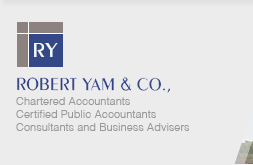One Tier Tax Exempt Dividend
All dividend receive by shareholders are tax exempt after 1 January 2008. As such, there is no requirement to include this income in your personal tax return.
Corporate Tax
Corporate tax rate: 18%
Tax Exemption Scheme for New Start Up Companies
From Year of Assessment (Y/A) 2005, normal chargeable income (excluding Singapore franked dividends) of up to S$100,000 for each of a qualifying company's first three consecutive Years of Assessment is granted tax exemption. With effect from Y/A 2008, the cap has been increased to S$300,000 and the exempt amount is computed as follows:
• 100% tax exemption on the first S$100,000;
• 50% tax exemption on the next S$200,000.
The first Y/A of a qualifying company refers to the YA relating to the basis period during which the company is incorporated. For example, if the company is incorporated on 7 May 2008 and has accounting period ending on 31 December, the company's first Y/A will be Y/A 2009 (basis period is 7 May 2008 to 31 December 2008).
Partial Tax Exemption
Companies that do not qualify for the tax exemption scheme for new start up companies will enjoy a partial tax exemption on their normal chargeable income (excluding Singapore franked dividends). From Y/A 2008, the exempt amount computed based on a company's first S$300,000 normal chargeable income is as follows:
• 75% tax exemption on the first S$10,000;
• 50% tax exemption on the next S$290,000.
Claim of Unutilised Capital Allowances/Losses/Donations in current Year of Assessment
• Companies are allowed to deduct unutilized capital allowances, trade losses and or donations (approved) incurred in one year against income in a subsequent year if there is no substantial change (>50%) in the ultimate shareholders and their respective shareholdings [ Section 23(4)/ 37(12) of the Singapore Income Tax Act];
• For unutilized capital allowances, there is an additional requirement that the company must be carrying on the same trade in the year the capital allowances were claimed and in the year it was utilized to setoff;
• With effect from Y/A 2003, any unutilized approved donations can be carried forward to be setoff against the income of the company for subsequent years, up to a maximum of 5 years.
Carry-back of Current Year Capital Allowances / Losses
• With effect from Y/A 2006, companies may deduct current year unutilized capital allowances / trade losses of up to S$100,000 against the assessable income for the immediate preceding Y/A if there is no substantial change (>50%) in the ultimate shareholders and their shareholdings [Section 37E(12) of the Singapore Income Tax
Group Relief
Group Relief (GR) is a system which considers group companies as one single company. Under this system, the unutilized capital allowances / trade losses / donations (approved) of the current year of one company will be deducted from the assessable income of the other company of the same group. This scheme was effective from Y/A 2003.
Criteria for qualifying as GR
The transferor (company which transfers any of its unutilised trade losses, capital allowances, donations) and the claimant (company which receives) have to:
• Be Singapore incorporated companies;
• Belong to the same group of companies and maintain 75% shareholding threshold;
• Have the same accounting year end.
WITHHOLDING TAX
(FOR PAYMENT TO NON-RESIDENTS OR NON-RESIDENT COMPANIES)
When a person makes payments of the following nature to a non-resident company, he has to withhold tax. The amount of tax withhold (i.e. withholding tax rate) is dependent on the nature of payment.
Nature of payment which attracts withholding tax include:
• Interest, commission, fee in connection with any loan or indebtedness
• Royalty or other payments for the use of or the right to use any movable property
• Payment for the use of or the right to use scientific, technical, industrial or commercial knowledge or information or for the rendering of assistance or service in connection with the application or use of such knowledge or information
• Management fees
• Rent or other payments for the use of any movable property
• Payment for the purchase of real property from a non-resident property trader
• Director fees paid to a non-resident director
Rate of withholding tax
Varies from 10% to 15% depending on the nature of payment and also whether the there is a Double Taxation Agreement concluded between Singapore and country in which the recipient of such payment is currently residing.
For director fees, the withholding tax rate is 18% (Y/A 2008).
Penalty for non-compliance
Maximum is 20% of the withholding tax outstanding for each Year of Assessment.


